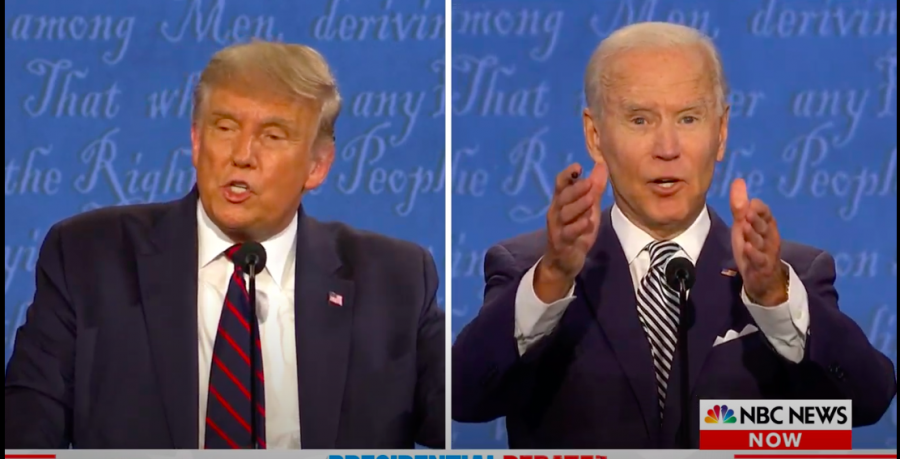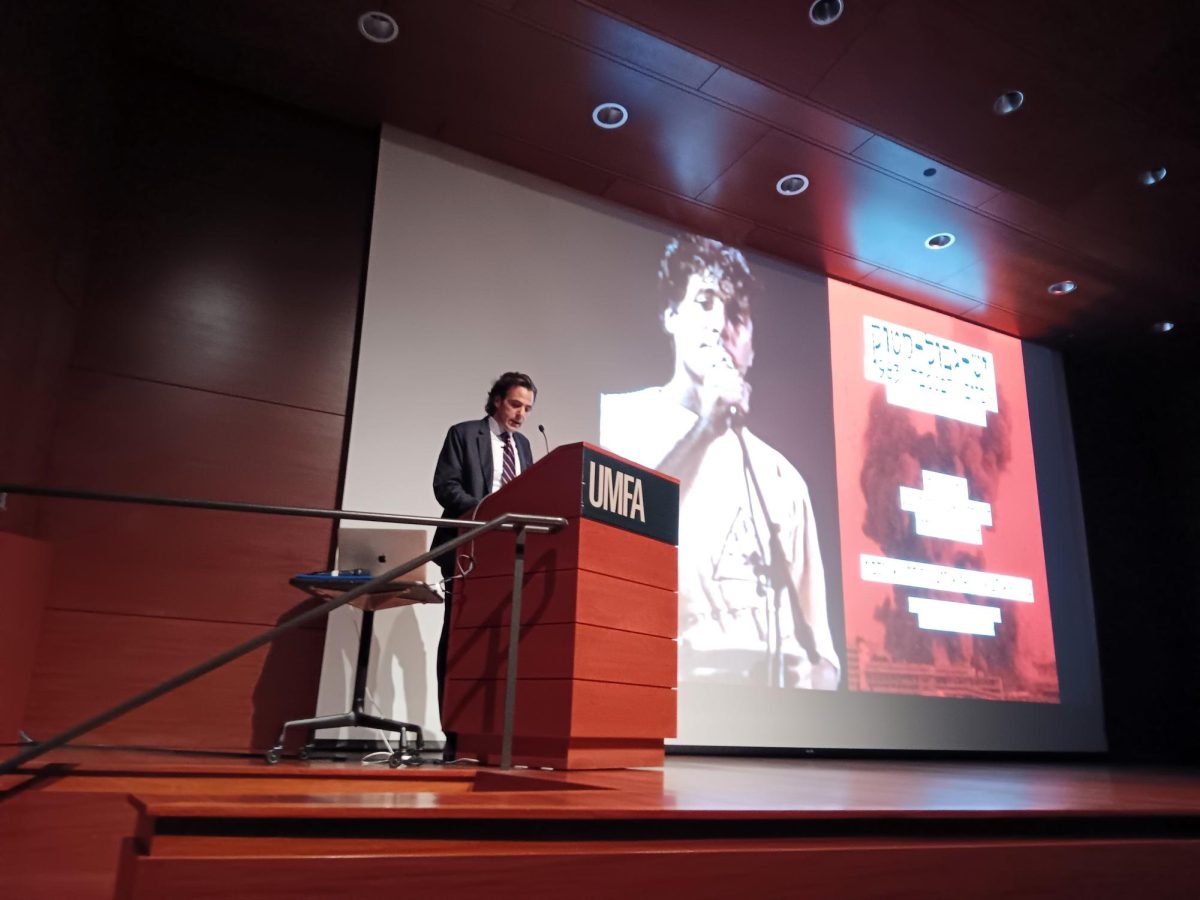In the summer of 1982, Israeli forces invaded southern Lebanon to root out the Palestinian Liberation Organization. What was meant to be a short conflict was an 18-year-long occupation.
These events were the subject of this year’s Dolowitz Lecture in Human Rights, which hosted a lecture by historian Seth Anziska on March 21 at the Utah Museum of Fine Arts Marcia and John Price Museum Building at the University of Utah.
Anziska is a Mohamed S. Farsi-Lindenbaum associate professor of Jewish-Muslim Relations at University College London, where he is the founding director of the Middle East Research Centre.
He said he started researching the invasion because it is a “historical black box.”
“Despite its lasting political importance, its social and cultural impact, the 1982 Lebanon war has largely been forgotten by the public and remains only selectively addressed by historians and wider society,” Anziska said.
Anziska’s lecture comes amid the ongoing war in Gaza, where Palestinians in northern Gaza are facing an imminent famine that United Nations Secretary General António Guterres calls an “entirely man-made disaster.”
“It is still too early to tell when and how the war in Gaza will end, but it has been among the most significant events since the founding of Israel and what the Palestinians called the Nakba, or catastrophe of 1948,” Anziska said.
Historical Background
Anziska began his lecture by providing context for the 1982 invasion. He said the relationship between Lebanon and Israel pre-dates the formation of the state, with the Zionist movement strengthening ties with Maronite Christians in the 1940s. He added the alliance fell in line with Zionists’ tendency to align with minority groups oriented toward Western nations.
This dynamic progressed in the 1970s when the PLO made a failed attempt to overthrow the Jordanian government, causing the PLO to relocate to Lebanon, forming what Anziska called a “state within a state,” where PLO militants launched attacks on Israel.
“The Palestinian presence more broadly raised tensions with the local Shiite Muslim and Maronite Christian community … contributing to the outbreak of the 1975 Civil War in Lebanon,” Anziska said.
In 1978, Palestinian commandos hijacked a bus in Tel Aviv and murdered 38 Israelis, including 13 children, in what is known as the Coastal Road massacre. Israel responded by sending 25,000 soldiers into southern Lebanon.
U.S. President Jimmy Carter spearheaded a UN resolution to establish a UN-backed Lebanon police force along the border to limit regional escalation.
Anziska said Israel’s escalation was part of a broader aim to prevent Palestinian statehood.
“Israeli leaders were increasingly anxious about the power of Palestinian calls for self-determination, which would increase in the wake of the 1978 Camp David Accords between Egypt and Israel,” he said.
Anziska added the conflict should be seen in the context of the Cold War. Ronald Reagan’s election saw a shift from Carter’s focus on human rights to a policy of “strategic consensus” focused on limiting Soviet influence.
“Israel was swiftly cast as a strategic ally of the United States and the PLO as a Soviet proxy,” Anziska said.
In 1982, a failed assassination attempt on Israel’s ambassador to the United Kingdom was falsely blamed on the PLO. Israel used this incident as a pretext to invade Lebanon.
New Research
Anziska talked about his finding of diplomat Charles Hill’s notebooks, detailing the discussion between Israeli Defense Minister Ariel Sharon and U.S. Secretary of State Alexander Haig, revealing the U.S. had knowledge and support for Israel’s second invasion.
Anziska’s findings also revealed growing dissent within the Reagan administration once the war began.
U.S. diplomat Philip Habib had a discussion with Israeli Prime Minister Menachem Begin, asking him to stop the bombing of Beirut. In the exchange, Begin describes PLO leader Yasser Arafat as a “little Hitler.”
“Invoking comparison to the PLO and the Nazis, something [Begin] often did during the war, isolated the Palestinian question in a larger historical frame of global anti-Semitism,” Anziska said.
Anziska added the comparisons served the purpose of dehumanizing Palestinians in Lebanon.
Habib helped negotiate a ceasefire that caused the PLO to evacuate from Lebanon. Anziska said the agreement required Israel to protect the Palestinian refugees in their controlled territories. Instead, Israel allowed militants with ties to the Maronite Christian Phalange Party into refugee camps in Beirut. The militants killed at least 800 Palestinians, most of whom were women and children, in what is known as the Sabra and Shatila massacre.
While Israel’s role in the massacre is well documented, Anziska’s research showed the U.S. role in the killings, with American diplomats being misled by Israel and failing to prevent the massacre.
“The U.S. role in abetting this process … was this moral stain and a strategic disaster undercutting U.S. influence in the region and precipitating further military involvement in the Lebanese Civil War,” Anziska said.
In Anziska’s research, he interviewed Hagai Tamir, an Israeli pilot who refused orders to bomb a target, later revealed to be a public school for boys.
“As I carried on with my research, this interview with Hagai stayed in the back of my mind. It restored human agency … to traditional military and diplomatic narratives of the war,” Anziska said.
The school was bombed shortly after by another pilot.
Anziska then tracked down Akram Zahtari, a Lebanese author who photographed the invasion when he was 16 years old from his friend’s balcony.
In one of Zahtari’s novels, he recounts a story his uncle told him about an Israeli pilot, believed to be a former student of the school he refused to bomb and dropped his explosives into the sea.
“Tamir had been mythologized as a Lebanese Jew, a former resident of Sidon, and his texts honor the narratives that have reached people in Lebanon,” Anziska said. “Here was lived reality cast as an urban myth, a moment of Israeli refusal refracted through the childhood memory of a Lebanese artist.”
Anziska concluded his lecture by saying that individual stories of resistance, while failing to change the war’s outcome, still provide valuable lessons.
“[From] these narratives … we can discern a different path, one that encompasses the human capacity for love, alongside the terrible impulse for violence.”













